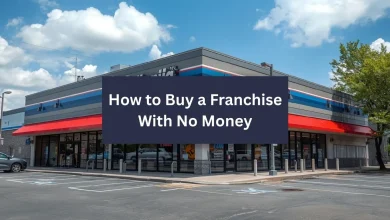7 Powerful Steps to Become a Successful Business Broker

Key Takeaways
- You don’t need to be a Wall Street banker to become a business broker—but you do need real skills, discipline, and credibility.
- The money is in: choosing the right niche, learning valuation, building trust, and managing deals professionally.
- Most new brokers fail not because of “no leads” but because they chase bad listings, overprice deals, and treat this like a side hustle.
- Done right, business brokerage can produce six- to seven-figure income, flexible lifestyle, and long-term referral deal flow.
- Start lean: get the basics (licensing, valuation, marketing, systems) right, then scale with relationships and reputation.
To become a business broker, you need to understand how businesses are valued and sold, meet any licensing requirements in your region, choose a clear niche, and position yourself as a trusted advisor to owners looking to exit. Practically, that means learning deal structures, reading financials, building a strong referral network (CPAs, attorneys, lenders), and using confidential, targeted marketing to match qualified buyers with sellable businesses—while getting paid via success-based commissions when deals close.
Introduction: So You Want to Sell Businesses for a Living?
The first time I sat across from a burnt-out manufacturing owner who whispered, “If I don’t sell this thing in the next 12 months, it’ll kill me,” I realized two things:
- Most business owners have no idea how to exit.
- Most people have no idea this job exists.
Business brokerage is where real money, real problems, and real people collide.
It’s not MLM. It’s not “quick commissions.” It’s not just posting businesses on a website and waiting.
You’re walking into decades of someone’s blood, sweat, and overdrafts… and helping them turn it into a life-changing wire transfer—without blowing up their staff, their suppliers, or their reputation.
If that sounds heavy, good. It should.
If it also sounds exciting, you’re in the right place.
Let’s walk through how to actually become a successful business broker—step-by-step, with zero fluff and plenty of real-world context.
Read Also: 10 Profitable Business Ideas You Can Start with $20K
Essential Skills & Mindset of a High-Performing Business Broker
Understanding the Real Role of a Business Broker
You are not “just selling businesses.”
You are:
- A translator between owner emotion and buyer logic
- A project manager of messy financials, lawyers, lenders, and deadlines
- A strategist who structures deals so everyone feels slightly uncomfortable—but says yes
At its core, your job is to:
- Prepare the business for sale
- Price it realistically
- Protect confidentiality
- Find qualified buyers
- Negotiate and manage the deal to close
The Mindset That Separates Pros from Pretenders
High-performing brokers:
- Think like owners, not sales reps
- Expect long sales cycles (6–12+ months) and plan their cash flow accordingly
- Don’t chase every listing—they qualify hard
- Protect their reputation like an asset
A little self-awareness moment: if you hate numbers, avoid confrontation, and want instant gratification… this path will humble you quickly.
Core Skills You’ll Use Daily
- Financial literacy: reading P&Ls, balance sheets, tax returns
- Communication: simplifying complex info for non-financial people
- Negotiation: firm, fair, creative
- Emotional intelligence: owners cry, buyers panic; you stay steady
- Problem-solving: every deal breaks three times before it closes
Read Also: How to Start a Hospice Business
How the Business Brokerage Industry Really Works (Behind the Scenes)
Who Hires Business Brokers (and Why)
Mostly:
- Owners who want to sell quietly
- Entrepreneurs looking to buy their first or next business
- Investors, searchers, small PE funds
- Franchisors & multi-unit owners exiting or expanding
They hire you because they don’t know buyers, don’t know valuation, and don’t have time to run a sale process without wrecking operations.
How You Get Paid
Typically:
- Success fee (commission): e.g., 8–12% on “main street” deals; % scaled for larger deals
- Sometimes upfront retainers or marketing fees
- Paid at closing. No close = no check.
Deal Timelines (Reality Check)
- 2–4 weeks: onboarding & valuation
- 1–3 months: marketing & buyer sourcing
- 1–2 months: negotiation & LOI
- 1–3+ months: due diligence & closing
You must be mentally and financially ready to work months before seeing a cent.
Read Also: How to Start a Hotel Business with No Money
Choosing Your Niche: Position Yourself for Maximum Profit
A scattered broker is a broke broker.
Common Niches
- Local “main street” (restaurants, salons, trades)
- Professional services (agencies, IT, accounting)
- Manufacturing, distribution
- Healthcare practices
- Online businesses / ecom / SaaS
- Franchise resales
How to Choose (Quick Filters)
Ask yourself:
- What industries do I understand (career, network, background)?
- Where are businesses profitable but owner-dependent (they need guidance)?
- Where is deal size aligned with my income goals?
| Niche | Typical Deal Size | Complexity | Good For |
|---|---|---|---|
| Local Retail/Service | $100K–$1M | Low-Med | Beginners |
| Trades / Construction | $500K–$5M | Med | Ops-minded, strong local network |
| Online Businesses | $100K–$5M | Med | Digital-savvy |
| Healthcare / Practices | $500K–$3M | Med-High | Detail-oriented, compliance-aware |
| Lower-Mid Market (M&A) | $5M–$50M+ | High | Experienced brokers |
Pick one or two lanes. Say “no” more than you say “yes.”
Formal Requirements: Licenses, Certifications & Legal Basics
(Always verify based on your country/state.)
Common Requirements
- In some regions (e.g., several U.S. states), you need a real estate license if selling businesses with real property or certain asset types.
- Engagement agreements must comply with local laws.
- You’ll routinely deal with:
- NDAs
- Non-compete clauses
- Fee agreements
- Confidentiality provisions
Certifications (Useful, Not Mandatory)
Helpful for credibility:
- Industry associations and broker certifications
- M&A training programs for larger deals
They signal seriousness—but clients value clarity, confidence, and results more than letters after your name.
Read Also: How to Start a Sprinter Van Business
Building a Strong Foundation: Knowledge Every Broker Must Master
If you can’t explain a business in numbers, you can’t sell it.
You Must Be Comfortable With:
- SDE (Seller’s Discretionary Earnings)
- EBITDA
- Revenue trends, margins, seasonality
- Normalizing financials (cleaning up owner perks)
Key Documents
- P&L statements
- Tax returns (usually 3 years)
- Balance sheets
- Lease agreements
- Equipment & inventory lists
- Customer & supplier concentration data
Red Flags You Learn to Catch
- All-cash reporting, no records
- One customer = 60%+ of revenue
- Heavy legal disputes pending
- “We make more than the tax return shows” (translation: big problem)
Becoming an Expert in Business Valuation (Without Being a CPA)
You’re not a forensic accountant, but you must do credible valuations.
Practical Valuation in Brokerage
- Market-based multiples (SDE or EBITDA)
- Asset-based for specific cases
- Discounted cash flow (more common in bigger deals)
Your Process (Simplified)
- Collect financials (3 years min).
- Normalize earnings (remove non-essential/one-time costs).
- Apply realistic multiples based on industry, risk, size.
- Stress-test: “Would a rational buyer pay this and still sleep at night?”
When to Bring in Specialists
- Complex, high-value, or regulated businesses
- Situations with disputes, divorces, or litigation
Communicate valuation calmly. An owner’s “my friend said it’s worth 3x more” is part of the job, not an insult.
Read Also: How to Start a Carpentry Business
Structuring Your Business Brokerage Practice
Your Options
- Join an existing brokerage: training, leads, lower split freedom
- Join a franchise: brand, systems, fees
- Go solo: max control, must build everything
Essentials to Set Up
- Legal entity
- Professional email + domain
- E&O insurance (where applicable)
- Standard NDAs & engagement agreements (reviewed by an attorney)
- CRM + secure file sharing + basic marketing stack
A lean but legitimate setup beats a flashy brand with sloppy agreements.
Creating a Powerful Personal Brand That Attracts Quality Clients
You’re asking owners to trust you with their life’s work. Look and sound like someone who deserves that.
Your Positioning
- “I help [type of business owners] exit smoothly, confidentially, and profitably.”
- Clear niche on your website and LinkedIn. Not “everyone and everything.”
Simple Authority Plays
- Educational LinkedIn posts about:
- Valuation myths
- How deals work
- Exit readiness tips
- Short videos breaking down real scenarios (anonymized)
- Case-style stories: “How we took a chaotic 7-figure plumbing company to a clean exit”
Social proof compounds. Show you know your craft.
Read Also: How to Start a Permanent Jewelry Business
Finding Sellable Businesses: Proven Client Acquisition Strategies
Here’s where most newbies hide behind logos instead of doing the work.
What Actually Works
- Building relationships with:
- CPAs
- Attorneys
- Bankers
- Fractional CFOs & consultants
- Thoughtful outreach to owners:
- Personalized letters
- Targeted emails
- Occasional calls (respectful, informed)
- Hosting:
- “How to Sell Your Business” webinars or breakfasts
First Conversation Cheat Sheet
Focus on:
- Their goals
- Their timeline
- Their numbers
- Their concerns (staff, legacy, confidentiality)
Close that call not by pushing a listing, but by offering clarity and next steps.
Read Also: How to Start a Caregiver Business
Qualifying Sellers: Avoiding Time-Wasters and Impossible Deals
Harsh truth: some owners are not ready, not serious, or not honest.
Qualify Fast By Asking:
- “Why do you want to sell?”
- “By when?”
- “How did you get to your desired price?”
- “Are financials up to date and filed?”
Walk Away If:
- They want 2–4x what the valuation suggests
- They refuse to share real numbers
- Their legal or reputational risk is radioactive
- They push you to “just list high and see”
Protect your time. Protect your name.
Packaging the Business for Sale Like a Pro
This is where you separate yourself from lazy brokers.
Your Prep Process
- Deep-dive interview with the owner
- Gather and clean core data
- Identify strengths, risks, opportunities
Create a Strong Confidential Information Memorandum (CIM)
Include:
- Business overview
- Financial summary
- Operations snapshot
- Customers & suppliers (discreetly)
- Growth opportunities
No fluff. No lies. No 30-page filler.
Read Also: 7 Powerful Steps to Sell Your Business to a Competitor
Confidential Marketing: Reaching Buyers Without Exposing the Business
You cannot afford a leak.
Best Practices
- Use blind listings (no names, no photos of branded signage)
- Require NDAs before sharing sensitive info
- Use coded references internally
- Share info in layers, not all at once
Your job is to pump exposure while keeping the staff from finding out via Google.
Building and Managing a Qualified Buyer Pipeline
Over time, your buyer list becomes an asset.
Types of Buyers
- Individual operators
- Strategic buyers (competitors, suppliers)
- Financial buyers (search funds, small PE)
How to Filter
Ask:
- “What’s your acquisition budget?”
- “How will you finance the purchase?”
- “What prior experience do you bring?”
If they’re vague on all three, they’re browsing, not buying.
Read Also: How to Start a Coffee Roasting Business
Mastering the Art of Deal Negotiation
Negotiation here isn’t movie-level drama. It’s structure, risk, and psychology.
Your Role
- Frame realistic offers
- Balance:
- Price
- Terms
- Seller support
- Financing
- Keep everyone talking when emotions spike
You’ll use:
- Earnouts
- Seller notes
- Holdbacks
to bridge gaps when price alone can’t.
Due Diligence Management: Keeping Deals From Falling Apart
Due diligence is where sloppy brokers lose deals.
You Help By:
- Preparing sellers early
- Creating a clear document checklist
- Managing expectations: buyers will poke holes
- Keeping communication central, calm, and documented
You’re the person who stops misunderstandings from turning into broken deals.
Financing the Deal: Helping Buyers Close
You’re not the lender—but you should understand the playbook.
Common Structures
- Bank/SBA-style loans
- Seller financing
- Investor equity
You guide both sides on what’s realistic so you don’t waste months on fantasy structures.
Closing the Deal: The Last 5%
This is where you earn your fee.
Final Steps You Help Orchestrate
- Definitive agreements
- Final inventory/equipment checks
- Training periods and handover
- Communication plans for staff & customers
Then: wired funds, signed docs, tired smiles.
Pro tip: follow up. Closed deals create new listings, buyer referrals, and your long-term brand.
Ethics, Integrity & Long-Term Success in Business Brokerage
If you cut corners, overprice knowingly, or leak info—you might win short-term, but you’re finished long-term.
Non-Negotiables
- Honest valuations
- Clear disclosures
- Transparent fee structures
- Avoiding shady buyers and sellers
Reputation is your compounding asset.
Leveraging Technology & Data to Gain a Competitive Edge
Act like a pro, not a hobbyist.
Useful tools:
- CRM to track:
- Owners
- Listings
- Buyers
- Secure data rooms for documents
- Email sequences for nurturing buyers and professionals
- Market data tools to support valuation ranges
Systematize what you can so you can focus on relationships and deals.
Scaling Your Business Brokerage Career
Once you’re closing consistently:
- Hire admin support
- Add junior brokers or partners
- Specialize deeper or move up to larger deals
- Offer exit-planning, valuation opinions, or advisory retainers
You go from “chasing listings” to running a proper advisory firm.
Daily Habits & 90-Day Action Plan to Get Started
If I had to start from zero today, here’s exactly what I’d do in 90 days:
First 30 Days
- Study:
- Valuation basics
- Deal structures
- Get compliant:
- Licensing (if needed)
- Legal agreements (via attorney)
- Define:
- One niche
- Clear value proposition
Days 31–60
- Launch a simple but sharp website & LinkedIn
- Have 30–50 conversations with:
- CPAs
- Lawyers
- Bankers
- Start educational content (1–2 posts per week)
Days 61–90
- Targeted outreach to business owners in your niche
- Offer:
- Confidential valuation reviews
- Exit-prep calls
- Aim to sign your first realistic sell-side engagement
Track:
- Conversations per week
- Listings signed
- Offers generated
- Deals closed
No drama. Just consistent, boring, professional execution.
Frequently Asked Questions
Income varies wildly. Some never get traction. Solid brokers can earn mid six-figures. Top performers in strong niches routinely cross seven figures—built over years, not months.
It helps, but it’s not mandatory. You do need to understand how real businesses operate: margins, staffing, customer risks, growth levers.
Technically, yes. Practically, deals demand responsiveness. Treat it like a serious business or you’ll struggle to win trust and close.
Plan for 6–12 months from starting to seeing your first commission. Build a financial buffer.
Mechanically, there are overlaps (listings, marketing, offers), but business sales are more complex. Financials, operations, staff, contracts—it’s a different animal.
Taking every listing at any price. Learn to say, “At that price, I can’t represent this in good faith.”
Summary
Becoming a successful business broker isn’t about being the loudest salesperson—it’s about being the most prepared, the most honest, and the most useful person in the room when an owner is ready to exit.
You:
- Build real skills in valuation, negotiation, and deal management
- Choose a niche and position yourself clearly
- Protect confidentiality and manage complex, emotional transactions
- Earn only when you perform—giving you unlimited upside but demanding professionalism
If you’re willing to treat this as a craft, not a side hustle, business brokerage can be one of the most rewarding careers in the finance and business world—financially and personally.



